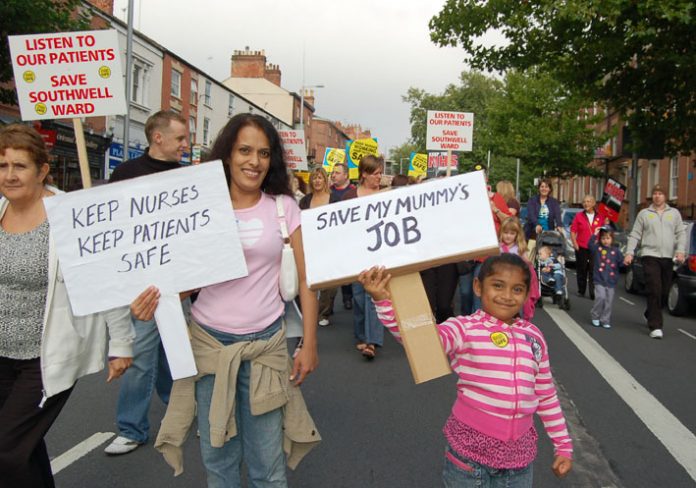Trade union leaders were meeting with health secretary Hewitt yesterday evening, on the day news emerged of a leaked ‘hit list’ of 77 NHS trusts marked down for cuts – with many A&Es and whole hospitals facing closure.
Speaking from the TUC on the eve of the meeting, GMB trade union official Sharon Holder told News Line: ‘The meeting was set up for the unions to take the strong views of the members expressed at last week’s NHS Together lobby which the health secretary was unable to attend.
‘We will now be raising the leaked information that the government has a list of 77 trusts for “reform” and “reconfiguration”.
‘In our language that means cuts in jobs and services.
‘If this list does exist, we will be asking if it is this government’s intention to drive through their reforms at any cost.
‘GMB members affected by unacceptable cuts in jobs and services will want the government to reverse them – and if not, they will take action.’
In response to the ‘hit list’, the British Medical Association (BMA) said in a statement to News Line: ‘We oppose all reconfiguration based on anything other than clinical grounds.
‘Any reconfiguration must be supported by a majority of local clinicians and there needs to be a meaningful dialogue with patients before any changes take place.
‘Politics and individual MP constituency areas should have no relevance in the reconfiguration debate. Decisions must be made on clinical grounds and not for political gain.’
The secret Department of Health ‘hit-list’, obtained under the Freedom of Information Act, spells out details of the trusts affected in a series of ‘heat maps’ which highlight the NHS trusts that ministers believe will face ‘media attention’ as a result of Blair’s ‘reforms’.
The maps assess whether the plans, in each case, will lead to national, regional or local media coverage, and predict the likely timing of any controversy and/or protests.
Among the trusts where closures or cuts give rise to concern are Surrey and Sussex Healthcare, Barnet and Chase Farm Hospitals NHS Trust, St George’s Healthcare Trust in Tooting, and NW London Hospitals Trust.
Under the ‘reconfiguration’ plans, district general hospitals are to be downsized or closed altogether in favour of ‘care in the community’.
Meanwhile, Hewitt has decided to push through cuts at Huddersfield NHS Trust in the face of massive local opposition.
• Second News Story
AVERAGE MEDICAL STUDENT DEBT £21,000
THE average final-year medical student owes more than £21,000, a British Medical Association (BMA) survey reveals today.
Results from the BMA’s annual medical student finance survey show that students graduating this year owe an average of £21,755 – more than the basic pay of their first job as a junior doctor.
The findings are based on questionnaires completed by 1,912 UK medical students between May and September 2006.
Nearly all (92 per cent) had a student loan, and six in ten (60 per cent) had an overdraft. Almost one in five (17 per cent) had a bank loan and two thirds (63 per cent) had around £1,000 of credit card debt.
One respondent owed £53,350, over a hundred students owed more than £30,000, and 13 per cent had debts in excess of £25,000.
The high debt levels are explained by the fact that medical students study for two or three years longer than those on most other courses, have fewer opportunities to work part-time, and face additional expenses for travel to hospitals, and equipment such as stethoscopes.
Debt levels are likely to get much worse, as the introduction this year of a top-up fee system allows universities to charge a fee up to £3,000 per year, as opposed to a flat rate of around £1,175 under the old system.
Students studying medicine as a second degree have to pay the new fees upfront each year.
Emily Rigby, chair of the BMA’s Medical Students Committee, commented: ‘This level of debt is deeply worrying for current students, and the future of the medical profession as a whole.
‘Becoming a doctor should be about your commitment to medicine and patient care, not the amount of money you are prepared to borrow.’
